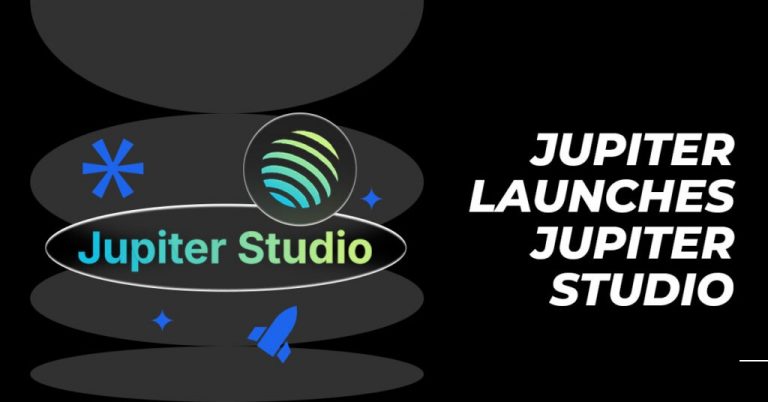
Jupiter, a leading decentralized exchange (DEX) aggregator on the Solana blockchain, has introduced its token launchpad, known as Jupiter Studio, which went live recently. This platform is designed to facilitate the creation and management of community tokens, offering features. Developers receive 50% of trading fees both before and after token graduation, incentivizing project creators.
Customization allows tailored token creation and management processes. Token Vesting, Supports structured token distribution with vesting schedules to ensure fair launches. Includes mechanisms to prevent early sniping and promote equitable token distribution. Dedicated Studio Page provides a user-friendly interface for managing token launches.
The launchpad leverages Jupiter’s DLMM algorithm for fair and transparent token pricing and allocation, dynamically adjusting based on market demand and supply. It also offers vesting, lockup, and liquidity mining incentives for long-term investor rewards. As of 2025, Jupiter’s LFG Launchpad has launched 78 projects, achieving $1.2 billion in Total Value Locked and expanding its user base to 780,000. It now includes advanced features like AI-powered risk assessment, multi-chain integration, and privacy-preserving transaction options.
Register for Tekedia Mini-MBA edition 18 (Sep 15 – Dec 6, 2025) today for early bird discounts. Do annual for access to Blucera.com.
Tekedia AI in Business Masterclass opens registrations.
Join Tekedia Capital Syndicate and co-invest in great global startups.
Register for Tekedia AI Lab: From Technical Design to Deployment.
Previous notable launches include the $WE token in January 2024, a meme coin inspired by a poem by Jupiter’s co-founder Weremeow, distributed to over a million wallets, and the $ZEUS token in April 2024, with 3% of its supply airdropped to eligible community members. The platform emphasizes community governance, with the Jupiter DAO and $JUP holders playing a key role in selecting projects for launch.
Jupiter Studio empowers creators to launch tokens with customizable features like vesting schedules and anti-sniper technology, lowering barriers for new projects, especially meme coins and community-driven tokens. The platform’s 50% trading fee share for creators incentivizes innovation and participation. With 78 projects launched and $1.2 billion in Total Value Locked (TVL) as of 2025, Jupiter Studio strengthens Solana’s position as a hub for DeFi innovation, potentially attracting more developers and users to the ecosystem.
The Jupiter DAO and $JUP token holders have a say in project selection, fostering a decentralized governance model. This aligns with DeFi’s ethos of community control and could set a precedent for other launchpads. Features like the DLMM algorithm and anti-sniper technology aim to ensure equitable token distribution, reducing manipulation risks and building trust among investors.
The fee-sharing model (50% of trading fees) provides a sustainable revenue stream for project creators, encouraging long-term commitment. Vesting, lockup periods, and liquidity mining rewards attract long-term investors, potentially stabilizing token prices post-launch compared to speculative pumps and dumps. The inclusion of AI-powered risk assessment and multi-chain support broadens the platform’s appeal, enabling cross-chain token launches and appealing to a wider audience.
Solana’s high-throughput, low-cost blockchain enhances the launchpad’s ability to handle large-scale token launches efficiently, positioning it as a competitor to platforms like Binance Launchpool or Ethereum-based launchpads. The success of tokens like $WEN and $ZEUS highlights Jupiter Studio’s role in capitalizing on meme coin trends, which resonate with retail investors and drive community engagement.
By integrating community-driven narratives (e.g., $WEN’s poem-inspired launch), Jupiter Studio taps into cultural trends, potentially increasing user adoption but also risking overhype in speculative markets. While Jupiter Studio lowers barriers for token creation, only well-funded or high-profile projects may gain significant traction due to marketing costs and community outreach needs. Smaller creators without resources may struggle to compete.
The 50% fee-sharing model benefits creators but could deter some investors if fees are perceived as high compared to other platforms. This may create a divide between projects with strong community backing and those without. Despite the user-friendly interface, creating and managing tokens requires some technical knowledge of blockchain and DeFi mechanics, potentially excluding less tech-savvy creators or communities.
Users in regions with limited internet access or regulatory restrictions on crypto (e.g., certain African or Asian countries) may face challenges participating in launches, exacerbating global inequalities in DeFi access. The Jupiter DAO’s reliance on $JUP token holders for project selection may favor wealthier or more influential holders, potentially sidelining smaller community members and creating a governance imbalance.
While decentralized, the DAO’s decision-making process could be swayed by strategic alliances or whale voters, undermining the platform’s fairness narrative. The focus on meme coins like $WEN and $ZEUS may prioritize speculative projects over those with strong fundamentals, creating a divide between short-term hype-driven tokens and long-term utility-driven projects.
Jupiter Studio competes in a crowded space with platforms like Pump.fun and Raydium. Projects with less visibility or weaker marketing may struggle, deepening the divide between successful and underperforming launches. As global regulators tighten rules on token launches (e.g., SEC scrutiny in the U.S.), projects using Jupiter Studio may face varying compliance burdens depending on their jurisdiction, creating disparities in launch feasibility.
While privacy-preserving transaction options are a feature, they may attract regulatory attention, potentially limiting access for users in strict regulatory environments. Jupiter could offer tutorials or partnerships to educate new creators, reducing technical and accessibility barriers. Implementing quadratic voting or caps on voting power could ensure smaller $JUP holders have a voice in project selection.
Prioritizing a mix of utility-driven and meme-based projects could balance speculative and fundamental-driven launches. Partnerships with local crypto communities in underserved regions could enhance accessibility and inclusivity. Jupiter Studio’s token launchpad is a significant step toward decentralizing and democratizing token creation on Solana, with features like AI risk assessment, anti-sniper tech, and community governance positioning it as a competitive player in DeFi.



